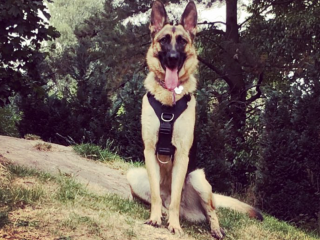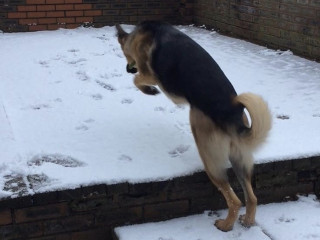We're here to help

Maddie's bout of sickness sparks warning over popular festive plant
There was no obvious explanation for two-year-old German Shepherd Maddie’s vomiting and hiccups – until owner Pauline Buckley noticed bits of colourful poinsettia all over her floor.
“I got the flowers as a gift just before Christmas,” Pauline said. “Maddie eats grass, but we’ve never had any problems with having plants and flowers in the house.
“She can be a bit of a crazy dog and has her mad half-hour where she’s very bouncy and jumps around, but she wasn’t really herself.
“She was making a lot of gulping noises and hiccupping, and her stomach was growling, which I’d never heard before. But when I saw bits of the plant on the floor, I knew what the problem was and quickly called Vets Now.”

It was around 8pm when Pauline discovered that Maddie had been snacking on the poinsettias, so her regular veterinary practice was closed. She called Vets Now in Liverpool, which provides out-of-hours emergency care for pets across Merseyside.
“Vets Now were really good with me, and we were waiting no more than 10 minutes,” Pauline said. “They took some advice on poisonous plants and then prescribed Maddie some tablets to flush the toxins out of her system.”
Poinsettias are originally from Mexico and are famous for reaching full bloom in December. In recent years they’ve become a staple decoration in UK homes over winter, with more than eight million sold.
Their iconic red petals are actually leaves and, because they contain chemicals called diterpenoid euphorbol esters, they’re mildly toxic to dogs and cats. Eating poinsettia can cause drooling, oral pain, diarrhoea and vomiting – but only if they’re ingested in large enough quantities.
On the plus side, the plant contains an irritant sap and, as a result, it’s unlikely dogs will ever eat enough to cause serious harm because of the taste and irritation from this.
Our nationwide network of out-of-hours clinics and pet emergency hospitals have seen an increase in greedy dogs being admitted with stomach complaints after swallowing the bright red houseplants.

Natalie West, a veterinary surgeon at Vets Now in Liverpool, said: “I hadn’t seen poisoning from poinsettias before and so we contacted the Veterinary Poisons Information Service to get some advice.
“As with almost all toxicity cases, the size of the dog and the amount they ingest determine how sick they become. Obviously, the bigger the dog the less likely they are to suffer after eating a small amount.
“So with Maddie being a fairly big dog, the effects of the poison were only mild so she could be sent home to recover with prescribed drugs. For smaller dogs, the dangers of poinsettias may be more acute. Our advice, therefore, is to keep poinsettias out of reach of all pets.”
Maddie was quickly back to her normal self, and owner Pauline has still got her poinsettias from before Christmas – albeit they’re missing a leaf or two.
“Maddie was back to normal the next day, and is still just as crazy now,” she laughed. “I still have the plant, but now I know she’s a grazer, I’m really keeping my eye on her. And the plants are in a much higher place!”
The Vets Now clinic in Liverpool – where Maddie received treatment – was recently rated as “outstanding” in the delivery of emergency and critical care by the Royal College of Veterinary Surgeons.
It’s one of a nationwide network of Vets Now clinics and pet emergency hospitals that are open through the night, seven-days-a-week, and day and night on weekends and bank holidays, to treat any pet emergencies that may occur.
All of Vets Now’s out-of-hours clinics and 24/7 hospitals have a vet and vet nurse on site at all times.
